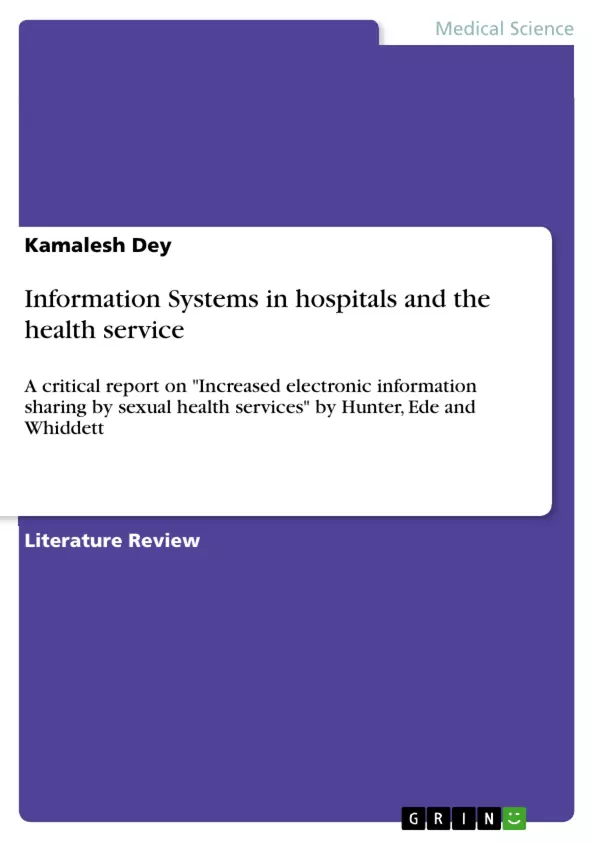The paper is a critique report of Hunter, Ede and Whiddett regarding “Increased electronic information sharing by sexual health services: Confidentiality and consent” published in the health informatics journal. The purpose of this report is to appraise critically of Hunter, Ede and Whiddett’s article using CASP (Critical Appraisal Skills Programme) tool and comment with supportive evidence on the article by following standard review checklist.
In addition, the article will be critically appraised through the various other quality checklists attached. Initially, the critique report will highlight on the author’s published article. It will also explore the study aim, objective, study design, outcomes, and any encountered biases if any. Finally, the report will summarise the key points of the article in the light of significance of the information system in hospital and health service system and how the published article integrates to the information system with sexual health services in the hospital.
Critique report or Critical appraisal is the analytical process of full of attention and systematically investigating research to assess its reliability, and its significance and relevance with an individual context. In addition, While Chambers, Boath, and Rogers defined that “critical appraisal as the assessment of evidence by systematically reviewing its relevance, validity and results to specific situations”. Moreover, in case of health research studies, critical appraisal is fundamental and significant component in term of evidence-based health services, treatment, medicine, and public health practice in the hospital or in the community what includes scrutinising the strengths, weaknesses, and the areas of improvement of a particular study.
Hunter, Ede and Whiddett (2014) presented in their published article regarding the implication of introducing the National Health Index (NHI) to share patient health information by sexual health services (SHS) with other external providers in New Zealand. This article, Authors inspected patient attitudes towards the modification in health services to support a combined model in the current care setting in New Zealand. Based on research outcomes, increasing sharing patient’s information without consent among external health providers’ would influence people
Inhaltsverzeichnis (Table of Contents)
- Introduction
- Analysis
- Strengths
- Weaknesses
- Conclusions
- Recommendations
- References
- Bibliography
Zielsetzung und Themenschwerpunkte (Objectives and Key Themes)
This report critically appraises Hunter, Haining Ede, and Whiddett's (2014) article on the implications of increased electronic information sharing by sexual health services (SHS) in New Zealand. The primary objective is to evaluate the article's strengths and weaknesses using the CASP (Critical Appraisal Skills Programme) tool and other relevant quality checklists. The report examines the study's aim, design, outcomes, and potential biases, focusing on the significance of information systems in hospital and health services.
- Patient confidentiality and consent in the context of sharing health information in sexual health services
- The impact of increased electronic information sharing on patient attitudes and behaviour in sexual health clinics
- The role of the National Health Index (NHI) in facilitating information sharing and its potential consequences
- The ethical considerations surrounding patient information sharing and the need for informed consent
- The influence of information systems on the delivery of sexual health services and the potential for improving patient care
Zusammenfassung der Kapitel (Chapter Summaries)
The Introduction section provides an overview of the article's purpose and methodology, outlining the use of CASP and other quality checklists for critical appraisal. It also defines critical appraisal and its significance in evidence-based healthcare practices. The Analysis section delves into the article's strengths and weaknesses, exploring the study design, data collection methods, and ethical considerations. The Conclusions section summarizes the key findings and implications of the article, highlighting the importance of patient consent and confidentiality in sexual health services.
Schlüsselwörter (Keywords)
The primary keywords and focus topics of the article are patient confidentiality, consent, electronic information sharing, sexual health services, National Health Index (NHI), qualitative research, and critical appraisal. These terms represent the core concepts and research focus of the study, emphasizing the ethical and practical implications of information systems in the context of sexual health care.
Frequently Asked Questions
What are the implications of electronic information sharing in sexual health services?
Increased sharing without explicit consent can influence patient attitudes and behaviors, potentially discouraging people from seeking care due to confidentiality concerns.
What is the National Health Index (NHI) in New Zealand?
The NHI is a system used to share patient health information across different external providers to support a combined model of care.
How is the article by Hunter, Ede, and Whiddett appraised?
The report uses the CASP (Critical Appraisal Skills Programme) tool to systematically investigate the reliability, significance, and relevance of the research.
Why is informed consent critical in sexual health informatics?
Due to the sensitive nature of sexual health, patients place high value on confidentiality, and unauthorized data sharing can lead to ethical and trust issues.
What are the strengths and weaknesses identified in the study?
The critique explores study design, data collection, and potential biases, highlighting areas where sexual health services integration with information systems can be improved.
- Quote paper
- Kamalesh Dey (Author), 2016, Information Systems in hospitals and the health service, Munich, GRIN Verlag, https://www.grin.com/document/333865



